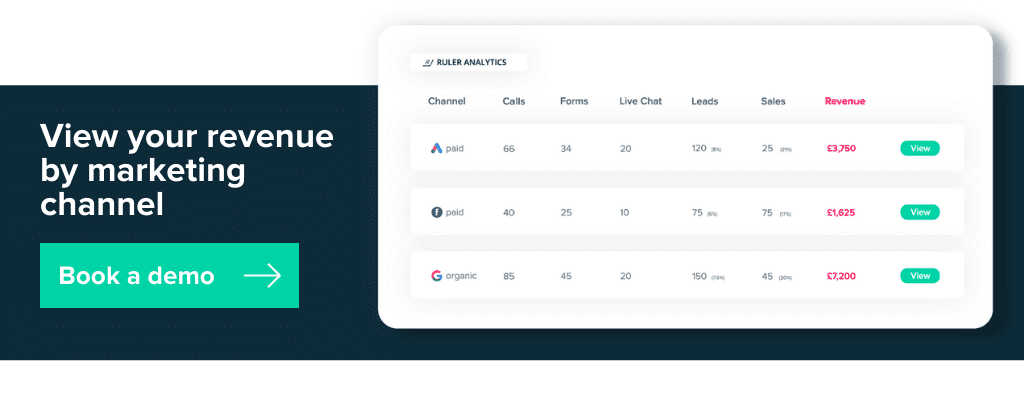Integrate your tech stack and gain powerful insights about your campaigns with these big data analytics tools.
Big data is all around us.
On average, we generate 2.5 quintillion bytes of data every day.
As we continue to generate more and more data, this number is only going to grow.
With the explosion of data, there has been an increase in the use of analytics and big data.
For this article, we narrow the breadth of solutions available and focus on the 7 must-have big data analytics tools to help you make smarter and more agile business decisions for your company.
Pro Tip
Why not consider Ruler Analytics? Ruler provides a 360 view of your marketing and sales touchpoints. It tracks every lead and interaction across the full customer journey. This allows you to track where your highest-converting customers come from and make data-driven decisions to improve ROI.
Everything you can discover in Ruler
So that we’re all on the same page, what are big data analytics tools, and how do they work?
Big data analytics tools pull data from multiple sources and allow companies to examine large quantities of data to uncover hidden patterns, correlations, insights and trends.
Big data analytics tools aim to allow us to make better decisions based on the data we have to improve overall efficiency and ROI.
Related: 5 ROI analytics tools to measure marketing success
With big data analytics, companies can:
When it comes to big data analytics, there are four main types:
Each of these analytics has a unique purpose in providing overall data-driven insights. Let’s take a closer look at each one.
Examines data sets to understand customer behaviour and business trends. This type of analytics tool is often used to make strategic decisions about pricing changes and marketing campaigns.
Uses a mathematical model to examine data sets to identify patterns and relationships. Its main purpose is to forecast future trends and estimate demand for products or services.
Provides unique insights into human behaviour to understand the feelings or attitudes behind people’s actions. They offer context on customer behaviours, emotions and other factors that are hard to come by in quantitative analytics tools.
Whereas qualitative analytics tools concern themselves with user behaviour, quantitative analytics tools focus on numerical data. Google Analytics is a good example of quantitative analytics. It focuses on reporting stats and metrics, like page views, sessions, and bounce rate, but it doesn’t show why your users do what they do.
There’s a lot to think about when it comes to big data analytics tools. Below, we’ve listed some factors you can take into consideration to help find the right fit for your existing tech stack.
Pricing for big data analytics software varies a lot. Some tools are affordable, while others can cost a small fortune.
Most solutions will have a price plan based on a set of criteria. But, it’s not uncommon for some providers to charge additional fees for setting up your account, integrations and extra usage.
Before you agree to or sign a contract, take time to understand what you are paying for and the value you’re receiving in return.
Big data analytics tools cost time and money. If you don’t pick the right ones for your business, that’s money down the drain.
Take note of each feature every solution has and take into consideration how they’ll benefit your workflow.
Integrations is a key factor when considering a big data data analytics provider. For big data analytics tools to be effective, they must have the ability to integrate with other tools and applications.
Take a look at your existing MarTech stack and verify that the tool you are looking at fits in with your existing technology.
When getting into big data, one of the biggest factors you need to consider is scalability. As big data grows, so will the number of tools needed to house and secure it. You’ll need to ensure that the solution you choose can grow and change with the rapid growth of data.
There is no perfect tool for big data analytics. Each one has its own unique value and positioning in the marketplace, despite having a lot of overlap in functionality.
There are many types of tools for big data analytics, but some are more effective than others. Let’s take a look at some of these tools and discuss how they can help your organisation.
Ruler opens a world of opportunity for data analysts and marketing ops managers who operate a multi-tech stack.
We may sound biased, but hear us out.
Ruler is a data analytics tool that aligns your anonymous visitors, leads and closed deals to provide actionable insights and data-driven insights.
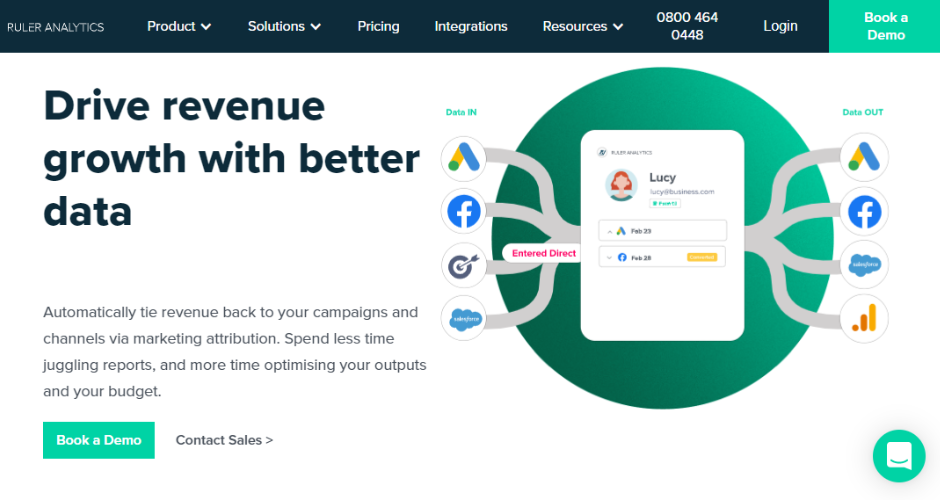
It works by tracking every visitor over multiple touchpoints, sessions, traffic sources, keywords and more.
Related: How to view full customer journeys with Ruler
When an anonymous visitor completes a conversion, whether that’s via form fill, phone call or live chat, Ruler will send all of the data it has captured about your lead to your CRM or sales tracking system.
Each contact in your CRM is enriched with Ruler’s attribution data, allowing you to keep track of your leads as they move down the funnel towards the purchase process.
Once a lead converts into a deal or sale, the customer’s information, such as the revenue amount and marketing data, is sent back to the Ruler database.
This information is then attributed across the customer’s touchpoints, allowing you to see which marketing channels are having the greatest impact on your revenue metrics and goals.
Related: How Ruler attributes revenue to your marketing
Ruler also integrates with just about any tool and traffic source, enabling a streamlined flow of data and accurate reporting across your entire tech stack.
At this point, you’re probably wondering what the benefits are of integrating Ruler into your existing tech stack. Ruler allows you to:
Pricing for Ruler starts at £199 a month, with plans based on features and the number of website visitors. You can save 20% by paying annually and there are special rates for agency partners.
Pro Tip
Want more information on Ruler and the services we offer? Book a demo to see Ruler in action and learn how it can help your data-driven decision making and improve ROI.
Book a free demo of Ruler
Adverity is an intelligent, end-to-end data and analytics platform that allows data-driven marketing teams to connect and manage their data sources in a single platform.
By consolidating siloed data and unveiling actionable insights, Adverity makes it easy for marketers to find new insights in real-time to identify opportunities and generate more revenue.
This results in data-backed decisions and eliminates the guesswork, allowing marketers to focus on the efforts that drive the highest ROI.
As it stands, Adverity doesn’t have a pricing page. So, you’re unable to compare packages and find the option that best fits your company. To find out pricing, you’ll need to request a demo of the product.
Improvado is a great solution for analytics and data leaders looking to collect and track data from all their marketing platforms in one place.
With Improvado, you can streamline all your marketing data with transactional data from your CRM.
This provides an in-depth view of your previous marketing efforts that are impacting revenue growth.
Customers using Impovado have access to more than 200 marketing platforms, business intelligence, and data visualisation tools. Plus, conversion paths can be monitored over multiple cross-channel attribution models.
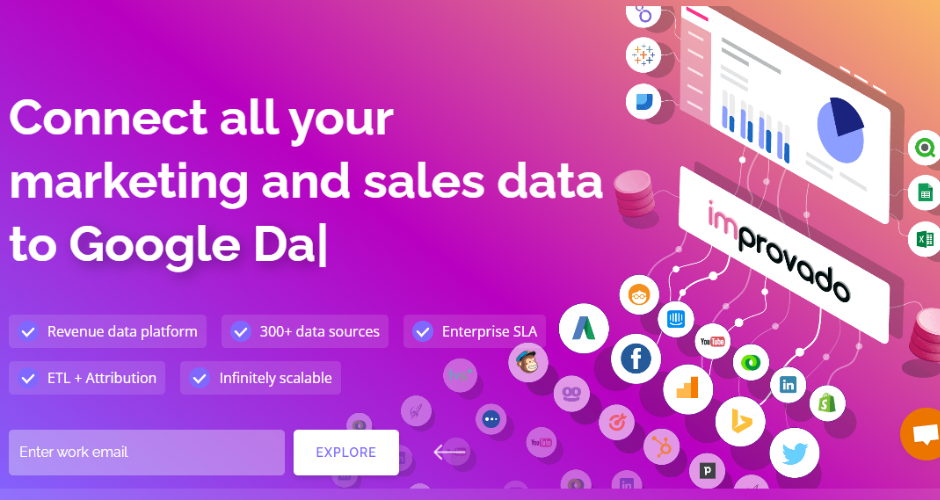
Pricing for Improvado depends on company needs and is custom based. To get pricing details, you need to set up a call with Improvado.
Another analytics tool on our list is Mixpanel.
In essence, Mixpanel is a product analytics tool that lets you capture data on how users interact with your digital product.
Mixpanel focuses on user behaviour and lets marketers see what their highest value customers are doing on their websites.
It organises your data without manual work, allowing you to unlock valuable customer insights to better convert, engage, and retain your target audience.
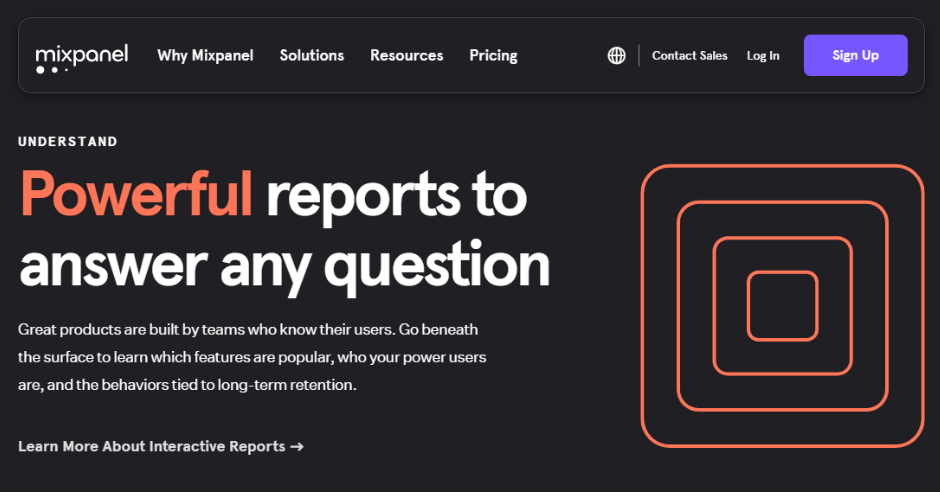
Mixpanel has a free version and offers a free trial. Mixpanel’s paid version starts at $25 per month.
Marketing Evolution is a web-based platform that allows you to measure and track the performance of your marketing campaigns by revenue.
It allows companies to use big data to understand which messages and campaigns work best and optimise accordingly to increase marketing efficiency.
Some notable features include marketing measurement and optimisation, media planning and brand planning.
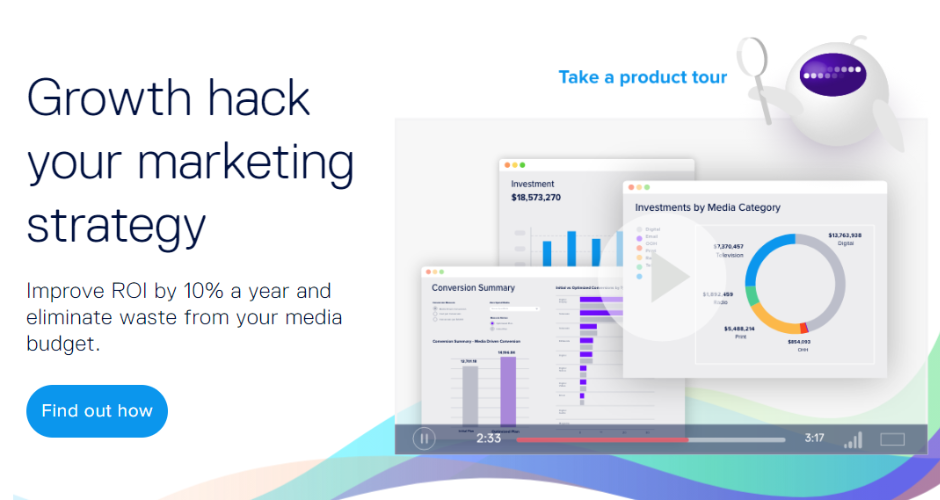
Marketing Evolution has no pricing available on their website. You’ll need to request a demo to learn more about features and pricing.
Among the many data visualisation tools, there’s one solution that stands out—Tableau. It’s sophisticated platform allows you to better track and understand your data.
Tableau seamlessly integrates with your existing technologies, such as your marketing analytics and CRM, to create a single source of truth of what is and isn’t working.
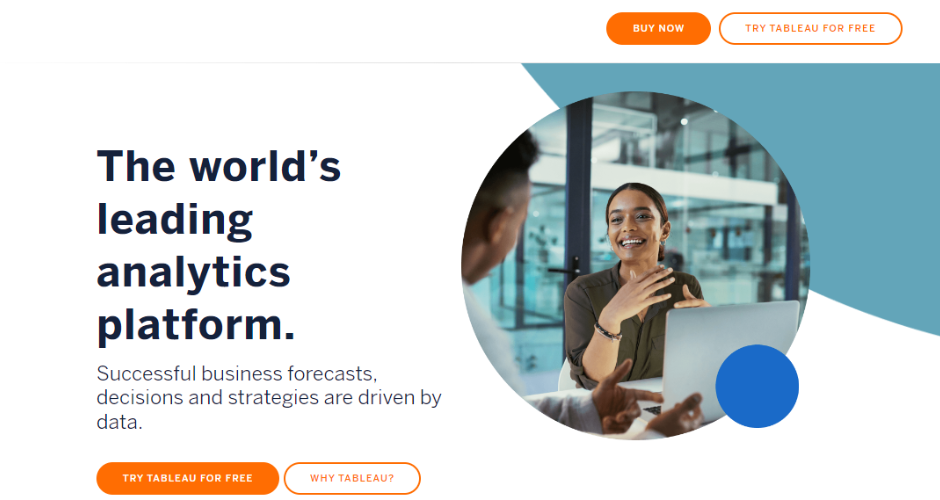
There’s a free version of Tableau, but with limited capabilities. Tableau’s pricing is available in three subscription options. Tableau Creator from $70, Tableau Explorer from $35 per month and Tableau Viewer from $12 per month.
Last but certainly not least, we have Zoho Analytics. In essence, Zoho Analytics lets you track and analyse data through a wide variety of data sources.
The purpose of Zoho Analytics is simple. It takes your data and displays it in a clear dashboard, allowing you to make decisions that will lead you toward success.
Zoho Analytics is an affordable reporting and data analysis tool, but it is only available to Zoho customers. So, if you’re not using Zoho to track data, then you’re out of luck.
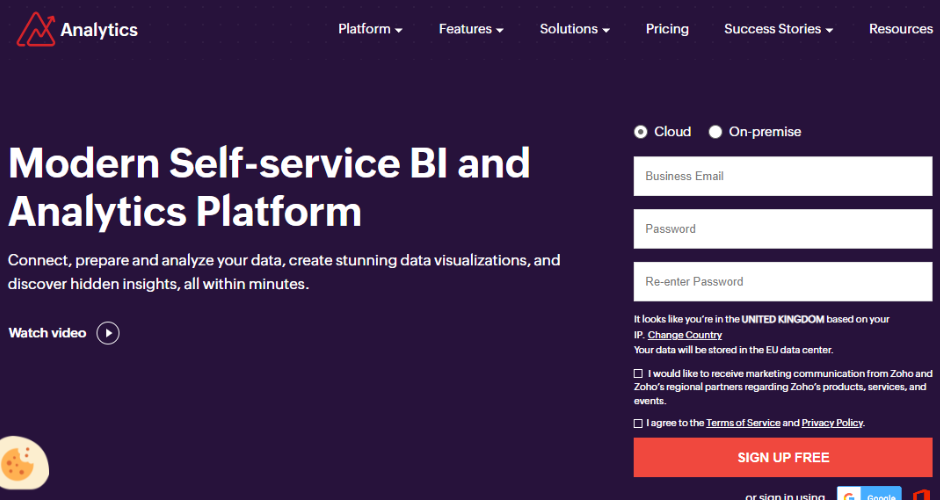
Pricing for Zoho Analytics starts at $25/month (supports two users, 500,000 rows & unlimited Workspace in the account).
There is no perfect big data analytics tool, each platform has its own distinct features and purpose.
What works for your team, might not work for another.
Ruler, however, is versatile and adaptable.
First, it provides qualitative and quantitative insights to track the interactions and behaviours of your visitors, leads and customers.
Second, you can use it as a standalone tool or in combination with other big data tools to enable the flow of marketing data between your teams.
Don’t take our word for it.
See how we’ve helped Brighttail navigate a complex buying process through attribution and data-driven insight. Or, if you’d prefer, book a demo and see Ruler in action for yourself.
